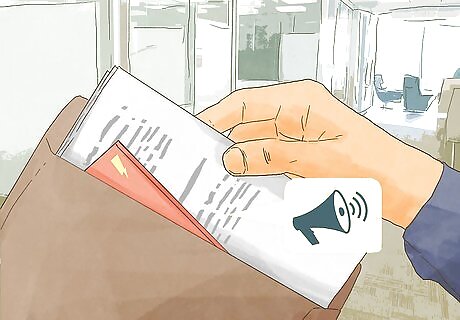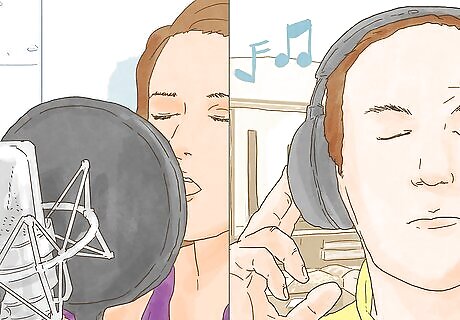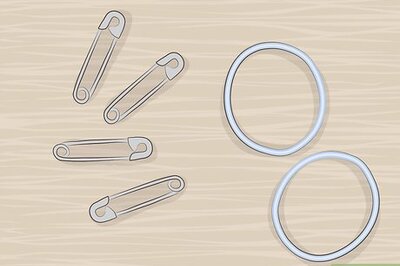
views
Determining How to Submit Your Music to a Label

Understand the music industry. You need to know a lot about the industry before you start submitting music to record labels. It is intensely competitive, and record labels are interested only in new artists who have the potential to generate revenue. Most musicians never land a record deal. Learn to accept lots of rejection without giving up or letting it break your spirit. Your only hope of being signed is having the potential to make money for the label. Being a great artist is not enough; you need a new sound, an attractive style, a fan base, and a celebrity persona.

Research various record labels to explore your options. Getting a label to sign you to a contract is every musician's dream, but it's actually a rare event, and you have to do everything you can to increase your chances. That means you want to find a label that matches your style. There are comprehensive record-label lists online. Search for the "record label directory" for your country. This should help you narrow the search. Look for labels that have signed artists similar to you. A record company won't want to sign anyone who's exactly like someone else they've signed, but you want to work with a company you know is receptive to your sound.

Understand that many major labels do not accept unsolicited demos. You may not be able simply to send a demo and expect it to be heard. In most cases in order to be signed to a big label, you have to have a manager, lawyer, or agent who will contact the company on your behalf. If you cannot afford a manager, agent, or attorney, don't lose hope! Contact the smaller labels while you continue to hone your skills as a musician.

Put together a press kit. This will include a demo of your best music. A press kit typically contains a demo song on CD, one or more headshots or group shots of your band, a description of your band and influences, a biography that explains how your band came together or how you came to make the kind of music that you do, and contact information for your agent and band members. You can also include a list of big gigs you've played, awards you've won, or other recognition you've received as an artist. Every document in the press kit should incorporate a band or artist logo to create a sense of unity among the various documents (and to prevent their getting lost). Your press kit should create a good first impression. It should be eye-catching and professionally designed and edited. If you don't have professional-level skills, pay someone to create a kit for you. Check out this helpful wikiHow article for more tips on putting together a press kit.
Contacting a Label That Accepts Demos

Visit your preferred label's website and locate where to send your demo. Most labels have a website where you can find contact information. This will probably be at the top or bottom of the home page and may be accessible by clicking "Contact Us" or "Frequently Asked Questions."
Send your entire press kit by priority mail. Package your entire press kit in a padded envelope and label it clearly. Make your package eye-catching but not juvenile. Include a personalized letter that indicates who you are, why you're sending the package, and exactly what you're hoping for in return. Your press kit should include photos, bio, and any other important information about your band.

Don't be discouraged if the company doesn't respond quickly. A&R representatives may get thousands of demos every week. It may be a while before someone is able to listen to yours. In some cases, you may never hear back. You can call or email the representative to follow up on a demo you've submitted, but don't expect a reply.

Send your demo to many labels including "indies." Sometimes it's better to go with an independent company. Often they're supported by a major label. Be sure to only send your music to labels that work with artists in your genre. Sending music to labels that have nothing to do with your style will only waste the time of the representatives and may earn you a bad reputation in the industry.
Getting Discovered Other Ways

Build a strong "live" show. When a record label considers an aspiring artist or band, they consider what kind of potential they have for selling out stadiums in live shows and making a profit in the long term, rather than just what they'll sound like on an album. You may have to play free shows at first in order to get publicity for your band. You may need a "day job" to support yourself financially during this time. Live shows help you build your fan base even without records to sell. Connect with your fans to make them feel valued and special. They'll be more likely to spread the word about your music if they are loyal to you.

Build an online presence with your name or your band's name. You can do this through social media or a professional website. Both would be even better. Keep your look consistent across your online profiles and pages. Invest in some professional photos of you and/or your band, or ask a photo-savvy friend to take some good ones for you. Make use social media platforms, such as YouTube, Soundcloud, Facebook, and Twitter. Include links to them on your webpage. Include digital version of your press kit, sample music, and up-to-date contact information on your pages. Add new recordings as often as you can, and maintain a likeable persona. People are more likely to help you publicize your work if they like you as a person.

Focus on your songwriting. Many great singers and talented musicians get overlooked because their music is not original or their lyrics are clichéd and stale. Focus on differentiating your sound from the rest of popular music in your genre. Get feedback from people who have a good sense of current music and are willing to offer constructive criticism. This should be an ongoing process as you hone your skills as a musician. Learn to take criticism and adjust your work accordingly. You can ignore unhelpful criticism, but if it is consistent, you should consider taking it to heart.

Polish your music. You need to invest in your track to make sure it sounds professional and polished before you send it off to record labels in a demo. That means you'll have to pay to record it in a real studio, and then either mix and master it yourself or pay an audio engineer to do it for you. The importance of sound quality cannot be overstated when it comes to getting the attention of a label. The first 10 to 30 seconds of your demo track are vital. Most record-label representatives have hundreds of demos to hear, so they won't listen to a mediocre one past the first 30 seconds. Yours needs to showcase your skill immediately.




















Comments
0 comment